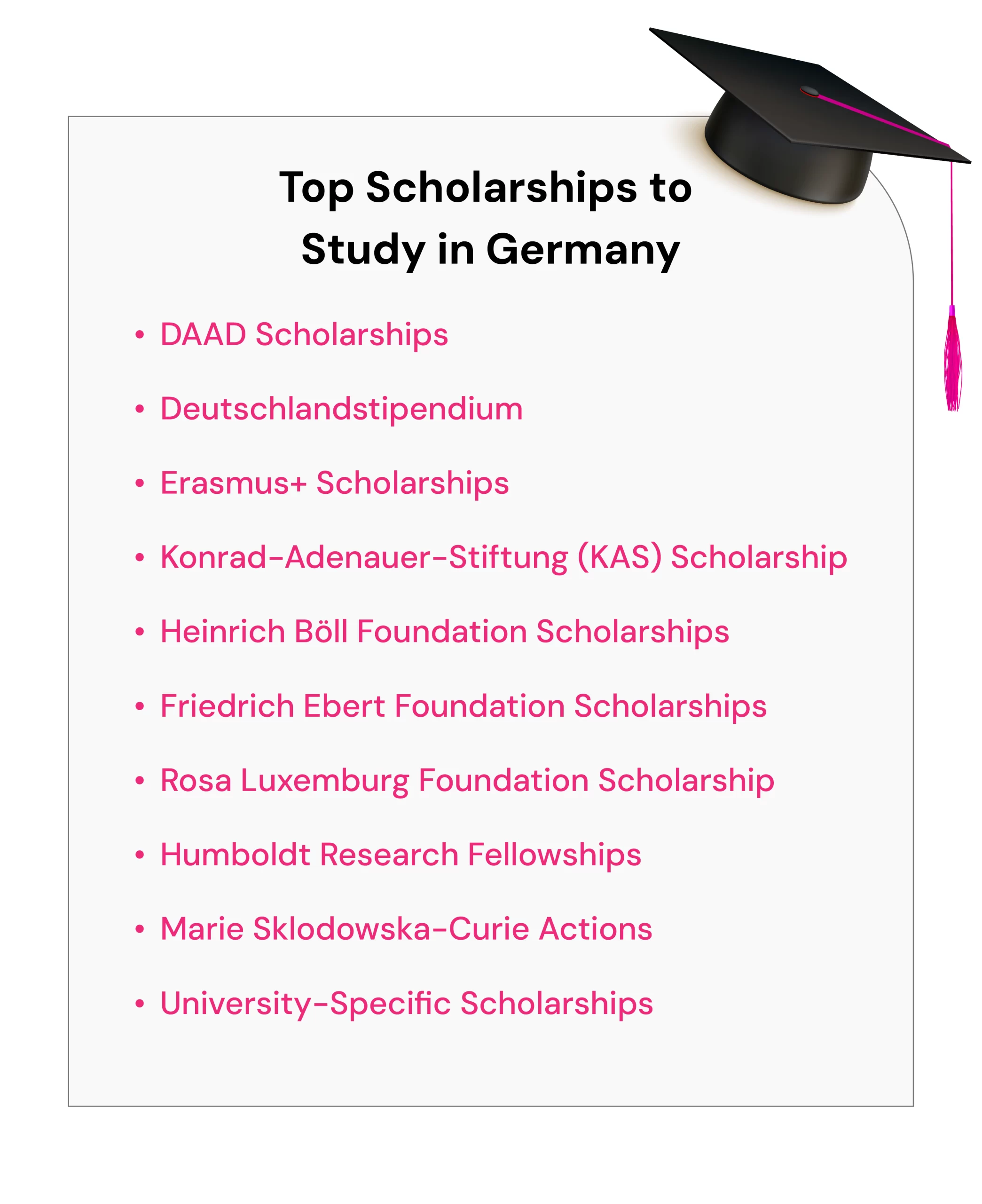Hotel Management Scope Overseas: Courses, Skills, Internships & Global Careers Explained
Scholarships to Study in Germany 2025: Top Programmes, Benefits & Application Guide

Over the years, Germany has progressively become one of the best places for foreign students to study – and with good reason. Not only is Germany the land of world-class education, state-of-the-art research, and career preparation, but it also has one more allure for students: an opportunity to get an excellent education at minimal or even zero tuition fees, accompanied by a wide variety of available scholarships that allow students of any socio-economic background to study here.
This ultimate guide will walk you through all you need to know about Scholarships to Study in Germany in 2025–26 – including DAAD, foundation, university, and European Union-supported scholarships like Erasmus+. Here you can also find application strategies, eligibility breakdowns, deadline calendars, and ways to increase your opportunities to win a fully funded position.
Why Germany?
Germany has emerged as one of the most sought-after study destinations globally, and it does not take much to figure out why. Here is a further insight into why thousands of international students choose to study in Germany every year:
1. Inexpensive or Free Tuition
The absence of tuition fees in state universities is one of the greatest factors that makes Germany so appealing. Tuition fees in state colleges and universities have been abolished by most federal states, in some cases entirely. Consequently, you are able to access quality education at a minimal cost compared to what you would spend in other countries such as the US, UK, or Australia. In instances where nominal semester fees are charged, it is usually between €250 and €350 to cover administrative expenses, transportation, and student facilities.
2. Exceptional Education System
German universities are traditionally ranked highly around the world, particularly in subjects such as engineering, computer science, life sciences, social sciences, and humanities. Universities such as the Technical University of Munich, LMU Munich, Heidelberg University, and RWTH Aachen are known for their excellent research, high standards of modern equipment and facilities, and international cooperation with one another.
3. Other & English-Taught Programmes
German is the official language, but now there are an increasing number of programmes taught in English, particularly at the master’s and doctoral levels. Indeed, there are more than 2,000 English-taught courses offered across disciplines, so you can take them even if you cannot yet speak German well.
Nonetheless, learning German is in itself extremely useful for everyday life and for working in Germany in the years to come.
4. Low Cost of Living
Germany can be considered one of the most cost-effective countries in Western Europe. The overall average expenditure per month as a student is between €850 and €1,200, depending on the city. Cities such as Berlin, Leipzig, or Dresden are likely to be less expensive than Munich or Frankfurt.
Students also receive subsidised transport in the form of discounted tickets on public transit, as well as subsidised food in university cafeterias, and inexpensive housing in the form of university dormitories or accommodation provided by the Studentenwerk (student services organisations).
5. Excellent Work Rights & Career Prospects
With a robust economy – the largest in Europe – Germany offers plenty of good employment opportunities, especially in the fields of engineering, IT, healthcare, business, and research. During their studies, international students are permitted to work up to 120 full days or 240 half days annually, which is useful for gaining experience and covering living costs.
Non-EU international students may also receive a post-study work visa of 18 months upon graduation to seek employment relevant to their field of study. Once employed, they can easily switch to a long-term residence permit or even permanent residency after a few years.
Top Scholarships to Study in Germany
Students are advised to check out the list of top scholarships to study in Germany mentioned below:

1. DAAD Scholarships (Deutscher Akademischer Austauschdienst)
The DAAD Scholarship is the best-known and most accessible scholarship for foreign students planning to Study in Germany. Administered by the German Academic Exchange Service, it provides funding for master’s, doctoral and even undergraduate studies in versatile fields. Advantages typically consist of a monthly stipend (€850 monthly during studies as a master’s student and €1,200 monthly during studies as a doctoral student), health and accident insurance, and travel expenses, and, in some cases, a subsidy to cover dependants or research costs.
Eligibility: Developing world and emerging countries students, with greater emphasis on postgraduate courses
Deadline: Varies depending on the programme (usually October/November/February)
2. Deutschlandstipendium (Germany Scholarship Programme)
Deutschlandstipendium is a publicly funded but privately organised programme that finances high-achieving students of all nationalities registered in German universities. It pays out €300 a month, of which half is government-paid and the other half paid by a personal sponsor, foundation, or company. Unlike a need-based scholarship, the Deutschlandstipendium is merit-based, and it rewards academic and social engagement as well as personal merit.
Who Are Eligible: German and international students whose grades are exemplary
Deadline: University-specific
3. Erasmus+ Scholarships
The European Union programme, Erasmus+, supports students who want to study, train, or undertake work experience in a foreign country (such as Germany). Although it mainly applies to exchange students in EU member states, non-EU international students who are enrolled to study in a member state programme can apply to the Erasmus programme. Travel costs, living expenses, and even short stays and/or entire degrees may be covered by scholarships. The programme is centred on the promotion of international cooperation, cultural exchange, and the development of skills.
Eligible Applicants: The applicants must be non-EU nationals studying in a university that has partnered with a German institution
Deadline: Normally at the start of the academic year
4. Konrad-Adenauer-Stiftung (KAS) Scholarship
The Konrad-Adenauer-Stiftung provides scholarships to foreign students who already have an undergraduate degree in their country and want to obtain a German postgraduate education (master’s or doctoral). KAS specifically targets students who (potentially) have excellent academic performance, political or social activism, and leadership potential, offering as much as €850 per month to master’s students and €1,200 to doctoral students, including health insurance coverage and family allowances.
Who is Eligible: Students who are devoted to the environment, fairness, and politics
Application Deadline: 1 March annually and 1 September annually
5. Heinrich Böll Foundation Scholarships
Heinrich Böll Foundation Scholarships are available to international students of any academic background to undertake degree programmes in any German university. This is a politically affiliated grant-making foundation committed to furthering democracy, ecology, gender equality, and social justice. Through scholarships, master’s students receive a stipend of €850/month and PhD students €1,200/month; there are also book, travel, and family allowances.
Eligibility: Politically and socially active international students
Due Date: July every year
6. Friedrich Ebert Foundation Scholarships
The Friedrich Ebert Stiftung includes students who prove to be academically gifted and possess a firm commitment to social democracy and civic engagement. African, Asian, Latin American, and Eastern European international students are particularly encouraged to apply. Students pursuing a master’s are allowed up to €850 a month, health insurance, and payments covering study-related expenses. Besides the financial assistance, the scholars can access training programmes, seminars, and political education events.
Eligibility: Bright students who are socially oriented, particularly from third world countries
Application Deadline: Rolling basis (early application is recommended)
7. Rosa Luxemburg Foundation Scholarship
The Rosa Luxemburg Stiftung awards scholarships to highly motivated international students with good academic credentials and personal interest in social justice, political activism, and volunteer work. It finances master’s and doctoral studies in Germany, providing a monthly stipend of €850 or €1,200 (students, depending on qualifying examination date) plus travel and book stipends. The foundation concentrates on realising senior students with underrepresented backgrounds and in developing countries, especially women, migrants, and those without academic family backgrounds.
8. Humboldt Research Fellowships
Humboldt Research Fellowship is intended especially for postdoctoral scholars worldwide, with the aim of performing long-term research stays in Germany. This programme is funded by the Alexander von Humboldt Foundation and has a monthly fellowship of €2,670, travel allowances, language training, and family support. It is aimed at postdoctoral researchers who have received their degrees less than four years ago and are working on multidisciplinary research.
9. Marie Sklodowska-Curie Actions (MSCA)
The MSCA fellowship is a Horizon Europe programme of the European Commission to fund researchers who are at all career stages. Although it is not purely German, it provides grants to research projects conducted within German institutions. Benefits include an excellent monthly allowance, mobility allowance, family allowance, and research costs. Strong research proposals and mobility requirements (not having lived more than 12 months in Germany during the past three years) are to be fulfilled by the applicants.
10. University-Specific Scholarships
Most of the German universities do provide merit-based or need-based scholarships to international students. The Deutschlandstipendium by the University of Heidelberg is an example, and the TUM Asia Scholarships by the Technical University of Munich is another. The RWTH Aachen University International Academy also provides funding to exceptional students in individual courses. Expectations depend on the programme but these scholarships are frequently partial tuition (where applicable), monthly living stipends, or research grants, and eligibility varies by programme.
Conclusion
Learning in Germany is not just an excursion in learning, it is an investment in your future. Germany is a dream come true for international students with its tuition-free public universities, world-class programmes, varied multicultural environment, and rich cultural experience. Nevertheless, living and any other costs may prove to be an impediment, and this is where the scholarship comes in wonderfully. Are you ready to make the leap? Then effective guidance is all that can change everything. MetaApply IE assists learners such as yourself, through the whole procedure, searching and locating that ideal scholarship, writing a good application, to ensuring that you get into the Top Universities in Germany. We lower the hoops of admission so you can concentrate on what matters: developing your future.
Frequently Asked Questions
Yes, there are a number of scholarships available in Germany including the DAAD Scholarship, Deutschlandstipendium among others, which can cover living expenses, health insurance, and travel expenses, among other costs. Full scholarships, though, are extremely competitive, and you will need excellent grades and a good application, in general, to win.
Not necessarily. English-taught programmes have many scholarships, particularly in the postgraduate programmes. But there is always an advantage to knowing German, at least in programmes that presuppose moving into neighbouring communities or working as interns.
The ideal time is to begin anything as early as 12–15 months prior to the start date of a desired programme. The vast majority of scholarship deadlines will fall during the autumn, between September and January of the current year, when applying to programmes beginning the following academic year. That is why it is necessary to be prepared in advance and make sure that you cover all requirements and present a good application.


















































